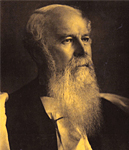 J.C. Ryle
J.C. Ryle
And we may rest assured that Paul was right. Depend upon it: the cross of Christ—the death of Christ on the cross to make atonement for sinners—is the center truth in the whole Bible. This is the truth we begin with when we open Genesis. The seed of the woman bruising the serpent’s head is nothing else but a prophecy of Christ crucified. This is the truth that shines out, though veiled, all through the Law of Moses and the history of the Jews. The daily sacrifice, the Passover lamb, the continual shedding of blood in the tabernacle and temple—all these were emblems of Christ crucified. This is the truth that we see honored in the vision of heaven before we close the book of Revelation. “In the midst of the throne and of the four beasts,” we are told, “in the midst of the elders, stood a Lamb as it had been slain” (Rev 5:6). Even in the midst of heavenly glory, we get a view of Christ crucified. Take away the cross of Christ, and the Bible is a dark book. It is like the Egyptian hieroglyphics without the key that interprets their meaning—curious and wonderful, but of no real use.
Let every reader of this [booklet] mark what I say. You may know a good deal about the Bible. You may know the outlines of the histories it contains and the dates of the events described, just as a man knows the history of England. You may know the names of the men and women mentioned in it, just as a man knows Caesar, Alexander the Great, or Napoleon. You may know the several precepts of the Bible and admire them, just as a man admires Plato, Aristotle, or Seneca. But if you have not yet found out that Christ crucified is the foundation of the whole volume, you have read your Bible hitherto to very little profit. Your religion is a heaven without a sun, an arch without a keystone, a compass without a needle, a clock without spring or weights, a lamp without oil. It will not comfort you. It will not deliver your soul from hell.
Mark what I say again. You may know a good deal about Christ, by a kind of head knowledge. You may know who He was, where He was born, and what He did. You may know His miracles, His sayings, His prophecies, and His ordinances. You may know how He lived, how He suffered, and how He died. But unless you know the power of Christ’s cross by experience, unless you know and feel within that the blood shed on that cross has washed away your own particular sins, unless you are willing to confess that your salvation depends entirely on the work that Christ did upon the cross—unless this be the case, Christ will profit you nothing. The mere knowing Christ’s name will never save you. You must know His cross and His blood, or else you will die in your sins.
As long as you live, beware of a religion in which there is not much of the cross. You live in times when the warning is sadly needful. Beware, I say again, of a religion without the cross.
There are hundreds of places of worship in this day in which there is everything almost except the cross. There is carved oak and sculptured stone; there is stained glass and brilliant painting; there are solemn services and a constant round of ordinances; but the real cross of Christ is not there. Jesus crucified is not proclaimed in the pulpit. The Lamb of God is not lifted up, and salvation by faith in Him is not freely proclaimed. And hence, all is wrong. Beware of such places of worship. They are not apostolical. They would not have satisfied St. Paul.
There are thousands of religious books published in our times in which there is everything except the cross. They are full of directions about sacraments and praises of the church. They abound in exhortations about holy living and rules for the attainment of perfection. They have plenty of fonts and crosses, both inside and outside. But the real cross of Christ is left out. The Savior and His work of atonement and complete salvation are either not mentioned or mentioned in an unscriptural way. Hence, they are worse than useless. Beware of such books. They are not apostolical. They would never have satisfied St. Paul.
St. Paul gloried in nothing but the cross. Strive to be like him. Set Jesus crucified fully before the eyes of your soul! Listen not to any teaching that would interpose anything between you and Him. Do not fall into the old Galatian error: think not that anyone in this day is a better guide than the apostles were. Do not be ashamed of the “old paths” in which men walked who were inspired by the Holy Ghost. Let not the vague talk of modern teachers, who speak great swelling words about “catholicity”1 and “the church” disturb your peace and make you loose your hands from the cross. Churches, ministers, and sacraments are all useful in their way; but they are not Christ crucified. Do not give Christ’s honor to another. “He that glorieth, let him glory in the Lord” (1Co 1:1).
____
From “The Cross of Christ” in Old Paths, The Banner of Truth Trust, banneroftruth.org.
J. C. Ryle (1816-1900): Anglican bishop and author; born at Macclesfield, Cheshire County, England.
1. catholicity – universality.
Courtesy of Chapel Library

Leave a Reply
Your email is safe with us.